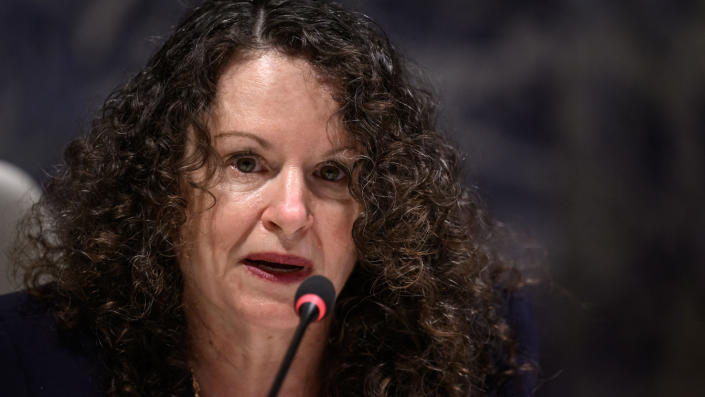WASHINGTON — American officials blasted a high-ranking United Nations diplomat in charge of monitoring the tense situation in Israel and the Palestinian territories, arguing that posts she made about the conflict there disqualified her from being an objective broker.
The offending posts were made in 2014 by Francesca Albanese, an unabashed critic of Israel who now serves as the United Nations human rights special rapporteur in the Palestinian territories.
The Times of Israel first reported on her posts earlier this week.
“America and Europe, one of them subjugated by the Jewish lobby, and the other by the sense of guilt about the Holocaust, remain on the sidelines and continue to condemn the oppressed — the Palestinians — who defend themselves with the only means they have (deranged missiles), instead of making Israel face its international law responsibilities,” Albanese — an Italian attorney — wrote in one post.
In another, she denounced “Israel’s greed,” using a classic antisemitic trope.
American officials sharply criticized the messages, which seemed to validate charges of anti-Israel bias in the U.N.’s Human Rights Council, where Albanese’s office is located.
“We are appalled,” said Michèle Taylor, U.S. ambassador to the UNHRC. “This is outrageous, inappropriate, corrosive, & degrades the value of the UN.”
In 2018, then-President Donald Trump withdrew from the UNHRC, citing its singular focus on Israel, to the exclusion of other problematic regions and regimes. Council members include repressive regimes like Afghanistan, Saudi Arabia, Russia, China, Qatar and others. The council has issued 95 resolutions against the Jewish state since 2006; by contrast, it has condemned North Korea’s despotic regime only 14 times.
There have been no resolutions against Russia or China, where authoritarianism is the norm.
The UNHRC did not respond to a request for comment from Yahoo News.
President Biden moved to rejoin the council in 2021, in keeping with his broader mission to reestablish the United States as a global leader. Albanese’s posts, however, present a potential challenge to that stance. Biden’s administration has recently prioritized tackling the rising problem of antisemitism.
“Such blatant antisemitic rhetoric — particularly when it’s an established pattern — is simply unacceptable,” Ambassador Deborah Lipstadt, the State Department’s special envoy to monitor and combat antisemitism, wrote on Twitter. “It severely undermines the credibility of the UN Human Rights Special Rapporteur to deal with the issue of human rights in the context of Israel & the Palestinian territories.”
Israel has shifted increasingly rightward politically in recent years, and Palestinians in the occupied territories of Gaza and the West Bank have been subjected to increasingly harsh treatment. However, most experts believe that anti-Zionism — effectively, denying the right of Israel to exist — is a form of antisemitism.
Albanese told the Times of Israel she now regrets making the remark. But on Twitter, she struck a defiant tone. “Thank you to those who have expressed their solidarity after yet another politically-motivated attack against my mandate,” she wrote. “The aim is to obscure the oppressive reality I am mandated to report on. I will not let anyone define who I am and what I stand for.”




